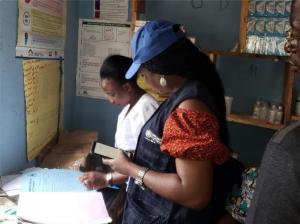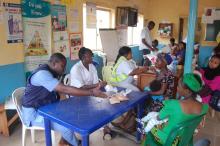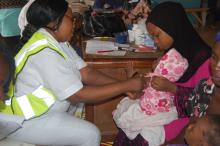WHO interventions in underprivileged communities positively impact RI turnout, disease surveillance
Abuja 08 August 2019 – Located in a slum on the outskirts of the Federal Capital Territory (FCT) at Dutse-Alhaji Primary Health Care Centre (PHC), baby Gift Okorie gazes deeply at Nurse Margaret Okpara as she drops a tinge of Vitamin A in her mouth.
“I’m happy that the majority of mothers at our facility have been consistent with the necessary routine immunization for their infants. I wish all Nigerian parents take routine immunization (RI) as seriously as these parents do,” she says.
Nurse Margaret, the Matron at the Dutse Alhaji PHC is one of the many beneficiaries of WHO’s RI supportive supervision capacity building interventions. Similar to over 10,000 health-workers trained by the World Health Organization (WHO) in RI/disease surveillance, case reporting, monitoring and evaluation, Nurse Margaret says,
“WHO has been extremely helpful in our facility. The Organization provide incentives during our outreach sessions in the slums, they have trained many of our health workers and we particularly and greatly appreciate their supportive supervision particularly in RI and surveillance, we have learned so much from WHO”.
Although located in densely populated areas like Dutse Alhaji, slum based health care facilities more often than not witness a large influx of patients as the services are usually free or available at subsidized prices. At Dutse Alhaji PHC for instance, an estimated 200 infants come for assessment and RI on a daily basis.
Supplementary Immunization Activity-natural complement to RI
In the past 12 months, WHO office in FCT has supported Supplementary Immunization Activity (SIA) teams and RI outreaches to immunize 25,595 under 5 children with Oral Polio Vaccine (OPV) in 69 border settlements across the 6 Area councils. A total of 17,841 have been immunized with OPV in 199 Nomadic settlements and 81,521 have been immunized with OPV in 165 Slum settlements across the 6 area councils of the FCT. Some of the slum settlements include Mpape, Dutse Alhaji, Idu Karmo, Dei-Dei, Dakwa.
However, like most low-budget health facilities, Mrs Florence Chinweike, a supervising nurse from the Bwari Area Council Health Department highlights challenges being faced in most slum-based facilities. “Our PHCs need more funding for outreach and more of our personnel need to be trained. We also need more qualified hands on deck and more quality equipment to work with,” she states. “We are nevertheless grateful to WHO because they have helped us to improve our record keeping system and closely follow up cases that need to be monitored.”
Meanwhile, in the neighbouring Karu LGA of Nasarawa State, Mr Alex Bahago, the Assistant Director Health, Karu LGA Secretariat mentioned that “WHO has been so helpful, particularly in technical facilitation, including organizing Immunization Plus Days (IPD), data collection and integrated disease surveillance and response.”
As stated by Mr Bahago, in Aso Pada Primary Health Care Centre, WHO provided support and assistance to run RI activities. A total of 3,833 children have received immunization from January to June 2019 for the following antigens(vaccines) - Measles, Inactivated polio vaccine (IPV), Bacillus Calmette–Guérin vaccine (BCG), OPV Pentavalent and Hepatitis B vaccines at various times depending on their age. Between 40- 60 children attend weekly immunizations sessions at the facility and 15- 20 children daily.
Promoting UHC in slums, rural, urban areas and everywhere
In total, there are 39,550 PHCs in Nigeria, of which many serve underprivileged communities including slums and WHO has worked closely with PHCs in rural and urban areas of the FCT and beyond. Twice every week, WHO personnel assist PHC health workers during outreaches in villages and slums.
“During our outreaches, we assist health workers to immunize at least 20 children every day and a total of roughly 40 children every week,” stated Dr Fureratu Zakari, FCT State Coordinator, WHO Nigeria.
“Over the past 6 months, WHO has built the capacity of over 100 Health workers in Bwari Local Government Area (LGA) and supported nearly 24 outreach sessions within the same period. We believe through building the capacities of health workers in underprivileged communities, the health indices will increase and residents of such communities will be more aware of vaccine preventable diseases and better advised on the right measures to take. These are all steps to achieve universal health coverage - for everyone everywhere”.
Dr Richard Banda; Email: Bandari [at] who.int (Bandari[at]who[dot]int); Tel: +234 803 888 8269
Ms Orjiako Chiaka; Email: orjiakoc [at] who.int (orjiakoc[at]who[dot]int); Tel: +234 810 447 5698





